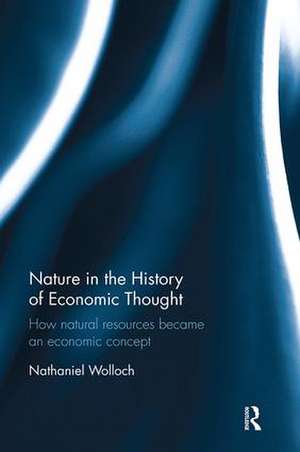Nature in the History of Economic Thought: How Natural Resources Became an Economic Concept
Autor Nathaniel Wollochen Limba Engleză Paperback – 28 iun 2018
| Toate formatele și edițiile | Preț | Express |
|---|---|---|
| Paperback (1) | 354.39 lei 6-8 săpt. | |
| Taylor & Francis – 28 iun 2018 | 354.39 lei 6-8 săpt. | |
| Hardback (1) | 1111.55 lei 6-8 săpt. | |
| Taylor & Francis – 7 oct 2016 | 1111.55 lei 6-8 săpt. |
Preț: 354.39 lei
Preț vechi: 455.41 lei
-22% Nou
Puncte Express: 532
Preț estimativ în valută:
67.82€ • 70.06$ • 56.44£
67.82€ • 70.06$ • 56.44£
Carte tipărită la comandă
Livrare economică 26 martie-09 aprilie
Preluare comenzi: 021 569.72.76
Specificații
ISBN-13: 9781138329881
ISBN-10: 1138329886
Pagini: 286
Dimensiuni: 156 x 234 x 23 mm
Greutate: 0.53 kg
Ediția:1
Editura: Taylor & Francis
Colecția Routledge
Locul publicării:Oxford, United Kingdom
ISBN-10: 1138329886
Pagini: 286
Dimensiuni: 156 x 234 x 23 mm
Greutate: 0.53 kg
Ediția:1
Editura: Taylor & Francis
Colecția Routledge
Locul publicării:Oxford, United Kingdom
Public țintă
PostgraduateCuprins
Preface
List of Abbreviations
PART I ATTITUDES TOWARD NATURE
FROM ANTIQUITY TO MERCANTILISM
1 From Antiquity to the Renaissance
2 Mercantilism and Natural Resources
PART II THE ENLIGHTENMENT ROOTS
OF CLASSICAL POLITICAL ECONOMY
3 Pre-Classical Enlightenment Developments
4 The Physiocrats and the Bread Riots
5 From Adam Smith to Classical Political Economy
6 John Stuart Mill and the Idea of Progress
PART III MANAGING THE USE OF NATURE
7 Managing Nature in the Enlightenment
8 Ricardo and Malthus on the Utilization of Nature
9 Jean-Baptiste Say and Other Contemporaries
10 John Stuart Mill’s Attitude toward Nature
Epilogue: From Socialism to Modernity
List of Abbreviations
PART I ATTITUDES TOWARD NATURE
FROM ANTIQUITY TO MERCANTILISM
1 From Antiquity to the Renaissance
2 Mercantilism and Natural Resources
PART II THE ENLIGHTENMENT ROOTS
OF CLASSICAL POLITICAL ECONOMY
3 Pre-Classical Enlightenment Developments
4 The Physiocrats and the Bread Riots
5 From Adam Smith to Classical Political Economy
6 John Stuart Mill and the Idea of Progress
PART III MANAGING THE USE OF NATURE
7 Managing Nature in the Enlightenment
8 Ricardo and Malthus on the Utilization of Nature
9 Jean-Baptiste Say and Other Contemporaries
10 John Stuart Mill’s Attitude toward Nature
Epilogue: From Socialism to Modernity
Recenzii
'Clearly written and carefully organized, this book restores the subject of nature to the history of economics. It demonstrates in rich detail that economists may not have given much weight to nature as an independent source of wealth, but from the Greeks to the modern era they have been profoundly important in shaping our use of the natural world.'
Donald Worster, University of Kansas, USA
Author of "Shrinking the Earth: The Rise and Decline of American Abundance"
'Clearly written and carefully organized, this book restores the subject of nature to the history of economics. It demonstrates in rich detail that economists may not have given much weight to nature as an independent source of wealth, but from the Greeks to the modern era they have been profoundly important in shaping our use of the natural world.'
Donald Worster, University of Kansas, USA
Author of "Shrinking the Earth: The Rise and Decline of American Abundance"
'Wolloch provides a clear and judicious account of the role of land in the thinking of some of the leading classical and Enlightenment economic writers, and demonstrates clearly that their major preoccupation was under-, not over-exploitation of that resource.'
Paul Warde, University of Cambridge, UK
'Wolloch’s main trope is that western economics has always treated nature as a dumping ground with little regard to questions of sustainability... his account serves to provoke further debate and invite the careful reader to revisit earlier economic discourse as a means to reflect on the human condition.'
Margaret Schabas, Journal of Modern History
Donald Worster, University of Kansas, USA
Author of "Shrinking the Earth: The Rise and Decline of American Abundance"
'Clearly written and carefully organized, this book restores the subject of nature to the history of economics. It demonstrates in rich detail that economists may not have given much weight to nature as an independent source of wealth, but from the Greeks to the modern era they have been profoundly important in shaping our use of the natural world.'
Donald Worster, University of Kansas, USA
Author of "Shrinking the Earth: The Rise and Decline of American Abundance"
'Wolloch provides a clear and judicious account of the role of land in the thinking of some of the leading classical and Enlightenment economic writers, and demonstrates clearly that their major preoccupation was under-, not over-exploitation of that resource.'
Paul Warde, University of Cambridge, UK
'Wolloch’s main trope is that western economics has always treated nature as a dumping ground with little regard to questions of sustainability... his account serves to provoke further debate and invite the careful reader to revisit earlier economic discourse as a means to reflect on the human condition.'
Margaret Schabas, Journal of Modern History
Descriere
From antiquity to our own time those interested in political economy have with almost no exceptions regarded the natural physical environment as a resource meant for human use. Focusing on the period 1600-1850, and paying particular attention to major figures including Adam Smith, T.R. Malthus, David Ricardo and J.S. Mill, this book provides a detailed overview of the intellectual history of the economic consideration of nature from antiquity to modern times. It shows how even someone like Mill, who was clearly influenced by romantic notions regarding the spiritual need for contact with pristine nature, ultimately regarded it as an economic resource.
Notă biografică
Nathaniel Wolloch is an Independent Scholar from Israel, specializing in European intellectual history. He is the author of Subjugated Animals: Animals and Anthropocentrism in Early Modern European Culture (2006), and History and Nature in the Enlightenment: Praise of the Mastery of Nature in Eighteenth-Century Historical Literature (2011).
